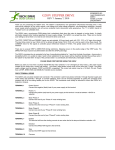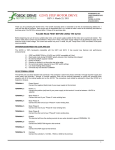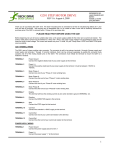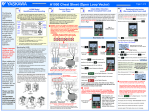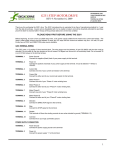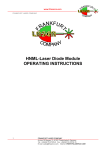Download G213V Manual
Transcript
G213V STEP MOTOR DRIVE REV 7: March 25, 2011 Thank you for purchasing the G213V drive. The G213V is part of Geckodrive‟s new generation of CPLD-based microstep drives. It has short-circuit protection for the motor outputs, over-voltage and under-voltage protection, over-temperature protection, reversed power supply polarity protection and will survive accidental motor disconnects while powered-up. The G213V uses a synchronous PWM design that is absolutely silent when the motor is stopped or turning slowly. It virtually eliminates stopped-motor heating regardless of power supply voltage. The STEP, DIRECTION and DISABLE inputs are opto-isolated. All three inputs work with 2.5V, 3.3V or 5V logic drive signals. The input drive current is now 2.5mA at 2.5V so almost all logic family (74LS, 74HC, etc.) can be used to drive these inputs. The COMMON return for the signals is controller ground referenced instead of +5VDC. This greatly eases the drive to controller interface. There are no unusual STEP to DIRECTION timing restrictions. Stepping occurs on the positive edge of the STEP pulse. The DIRECTION input must be true 200nS before and after this STEP pulse edge. The G213V microstep drive is warranted to be free of manufacturing defects for 1 year from the date of purchase. Anyone who is dissatisfied with it or is unable to make it work to their satisfaction for any reason will be cheerfully refunded the purchase price if the G213V is returned within 15 days of the purchase date in a cosmetically and electrically undamaged condition. PLEASE READ FIRST BEFORE USING THE G213V Before you start you must have a 2-phase hybrid PM step motor (ordinary 1.8 or 0.9 degree per step motor), a DC power supply suitable for the motor and a current set resistor. The motor‟s rated phase current must not be more than 7 Amps. The power supply voltage must be between 15VDC and 80VDC unregulated. The current set resistor may be a 1/4-Watt, 5% part. Finally have a STEP, DIRECTION and DISABLE (if needed) source available. G213V TERMINAL WIRING The G213V uses a 2-piece modular main connector. The connector is split in two pieces; terminals 1 through 6 (power supply and motor leads) and terminals 7 through 12 (control interface). Each can be removed separately by pulling the connector body upwards and off of the mating header pins on the G213V. The connectors must initially be removed to mount the G213V to a heatsink or chassis. TERMINAL 1 Power Ground Connect the negative (black) lead of your power supply to this terminal. TERMINAL 2 Power (+) Connect the positive (red) lead of your power supply to this terminal. It must be between +18VDC to +80VDC. TERMINAL 3 Motor Phase A Connect one end of your “Phase A” motor winding here. TERMINAL 4 Motor Phase /A Connect the other end of your “Phase A” motor winding here. TERMINAL 5 Motor Phase B Connect one end of your “Phase B” motor winding here. TERMINAL 6 Motor Phase /B Connect the other end of your “Phase B” motor winding here. TERMINAL 7 Disable This terminal will force the winding currents to zero when tied to the step and direction controller +5V. TERMINAL 8 Direction Connect the DIRECTION signal to this terminal. TERMINAL 9 Step Connect the STEP signal to this terminal. TERMINAL 10 Common G213V STEP MOTOR DRIVE REV 7: March 25, 2011 Connect the controller‟s GROUND to this terminal. TERMINAL 11 Current Set Connect one end of your current set resistor to this terminal. TERMINAL 12 Current Set Connect the other end of your current set resistor to this terminal. POWER SUPPLY WIRING TERMINAL 1 Power Ground Connect the power supply ground to term.1 TERMINAL 2 Power (+) Connect the power supply “+” to this terminal The power supply voltage must be between 15 VDC and 80 VDC. The maximum power supply current required is equal to the motor‟s rated phase current. An unregulated power supply may be used so long as the voltage stays between the specified limits; keep the power supply ripple voltage to 10% or less for best results. CAUTION! Power supply voltage in excess of 80 VDC will blow the G213V internal fuse. CAUTION! Reversed power supply polarity will blow the G213V internal fuse. CAUTION! Never put a switch on the DC side of the power supply! This will damage, if not destroy, your drive! The choice of power supply voltage depends on the required high-speed performance from the motor; doubling the voltage doubles the motor‟s high-speed power. In all cases the power supply voltage should be no less than 4 times or no more than 20 times the motor‟s rated voltage. The motor may not run as smoothly as possible if the power supply voltage is less than 4 times or more than 20 times the motor‟s rated voltage. A power supply voltage greater than 20 times the motor‟s rated voltage may overheat and damage the motor. Motor winding inductance should be 500uH or greater. A more accurate calculation of power supply voltage is to find your motor‟s inductance, and put it into the following equation. 32 * (√mH inductance) = Power Supply Voltage If your motor has 2mH of inductance, the equation would look as follows. 32 * (√2) = 45.12V MOTOR CONNECTION TERMINAL 3 Phase A Connect one motor winding to this terminal TERMINAL 4 Phase /A Connect the other end of the winding to this terminal TERMINAL 5 Phase B Connect the other motor winding to this terminal TERMINAL 6 Phase /B Connect the other end of the winding to this terminal One motor winding connects to terminals 3 and 4 and the other winding connects to terminals 5 and 6. Turn the power supply off when connecting or disconnecting the motor. If the motor turns in the wrong direction, reverse the motor winding connections to terminals 3 and 4. CAUTION! Avoid shorting the motor leads to each other or to ground or the G213V will enter protective shut-down. 4-wire, 6-wire and 8-wire motor may be used. If 6-wire motors are used, they may be connected in half winding or full winding. This is equivalent to an 8-wire motor connected in parallel or series. If a motor is connected in series or full winding, the motor‟s G213V STEP MOTOR DRIVE REV 7: March 25, 2011 phase current rating is half of its parallel or unipolar rating. The choice depends on the high-speed performance required; a parallel-connected motor will provide twice the power of a series-connected motor at the same power supply voltage. DISABLE PIN TERMINAL 7 Disable This terminal will force the winding currents to zero when tied to the step and direction controller +5V. The DISABLE input on the G213V is optically isolated and requires logic “1” to DISABLE and logic “0” to ENABLE the drive. Once it is disabled, the motor windings are unergenized and the motor freewheels. STEP AND DIRECTION INPUTS TERMINAL 8 Direction Connect the DIRECTION line to this terminal. TERMINAL 9 Step Connect the STEP line to this terminal. TERMINAL 10 Common Connect this terminal to the controller GROUND These 3 inputs are optically isolated from the rest of the drive. They will operate with 2.5V, 3.3V or 5V logic outputs with 2.5mA minimum source drive current. The STEP input‟s maximum rated frequency is 350kHz with a 50% duty-cycle waveform. The G213V steps the motor on the 0 to 1 logic (positive) edge of the STEP signal. TERMINAL 11 Current Set Connect the current set resistor to this terminal TERMINAL 12 Current Set Connect the other end of the current set resistor to this terminal This input matches the G213V‟s current output to the motor windings. The G213V will accommodate motor winding currents from 0 to 7A. Use the following equation to calculate the value, (in kilo-Ohms) of the current set resistor: R (in kilo-ohms) = 47 * I / (7 – I) Use the nearest standard value 5% tolerance, 1/4W resistor for this setting. Here are the current set resistor values for motor current in .5A increments. Round the appropriate answer to the nearest 5% resistor value. a. b. c. d. e. f. g. h. i. j. k. l. m. 1A – 7.8K 1.5A – 12.8K 2A – 18.8K 2.5A – 26.1K 3A – 35.25K 3.5A – 47K 4A – 62.67K 4.5A – 84.6K 5A – 117.5K 5.5A – 172.33K 6A – 282K 6.5A – 611K 7A – OPEN OTHER CONSIDERATIONS: HEATSINKING: The G213V needs heatsinking for current settings greater than 3 amps. The case temperature (measured on the bottom plate) should not exceed 70 degrees C, and for best life should be kept at 50C degrees or less. Use heatsink compound between the G213V and your heatsink. CAUTION! Current settings above 3A without a heatsink may result in the G213V entering thermal shutdown. AUTO CURRENT REDUCTION: The G213V reduces motor phase current to 71% of the set current value 1 second after the last step pulse is sent. The G213V also changes to a special recirculating current mode to nearly eliminate motor heating. G213V STEP MOTOR DRIVE REV 7: March 25, 2011 ADJUST: This trimpot adjusts the motor for the smoothest possible low-speed operation. Set the motor speed to about 1/2 revolution per second and then turn the trimpot until a distinct null is noted in the motor‟s vibration. This will result in the most even microstep placement for a given motor and power supply voltage. The default setting for this trimpot is at ½ -turn and the setting for your motor will be within +/- ¼-turn of the default setting. G213V INDICATORS: POWER LED: The GREEN POWER indicator is lit whenever the G213V has power supply voltage applied. FULL POWER LED: The YELLOW FULL POWER indicator is lit when the motor is turning fast enough to generate maximum possible mechanical power. Power is torque times RPM and power output reaches its maximum value when this indicator is lit. Use this indicator to verify your motor is optimally geared to the load. ERROR LED: The RED ERROR indicator is lit when: 1) During power-on reset for 1 second when power is first applied to the G213V. 2) While the DISABLE input is active. 3) When there is a short-circuit on any motor output. Momentarily activate the DISABLE input to reset. 4) During over-temperature shutdown. The LED automatically resets when the drive temperature drops. INTERNAL FUSE: The G213V uses a socketed, user-replaceable internally mounted fuse (Littlefuse Inc. part # 0251005.MXL). Reversing the power supply polarity or a power supply voltage over 114VDC will cause the internal fuse to blow. CAUTION! Do not use any other type of fuse, do not bridge a blown fuse with wire and do not solder the fuse in place. Doing so will void the drive‟s warranty. REMOVING AND REPLACING THE COVER: REMOVING THE COVER: 1) 2) Remove the two 2-56 phillips-head screws on the bottom of the drive. Slide the cover backwards until it clears the drive. REPLACING THE COVER: 1) 2) Slide the cover forward over the drive while lifting the back of the cover. Replace the screws on the bottom of the drive. ADJUSTING MICROSTEP RESOLUTION The G213V has an onboard step pulse multiplier called the G901X that allows the drive to operate in full step, half step, 5 microstep and 10 microstep modes. The G901X uses a 2mm jumper block and two jumpers to set the resolution. The jumper block can be found by using the diagram below: G213V STEP MOTOR DRIVE REV 7: March 25, 2011 Once the jumpers have been located they may be set according to the diagram below. Please note that the four pins closest to the optoisolator are unconnected and can be used as jumper storage. It is recommended that needle nose pliers or tweezers be used to adjust the jumper settings. The power to the G213V must be turned off before any adjustment is to be made on the step pulse multiplier. METHOD OF OPERATION FOR STEP PULSE MULTIPLIER: The G901X step pulse multiplier still allows all of the benefits of microstepping at low speeds and full stepping at high speeds that the G203V has. The step pulse multiplier works by outputting a set number of pulses to the main motor control board it is attached to, which is the G203V in the case of the G213V. If the step pulse multiplier is set to full stepping mode it will output ten microsteps for every pulse it receives on its input; as far as the base drive is concerned, it is always microstepping at its normal rate. This means that the drive will continue to morph to full step at higher speeds to allow the highest possible torque from the motor. TROUBLESHOOTING: EVERYTHING IS CONNECTED, NOTHING HAPPENS: Is the GREEN LED lit? If not, either the G213V has no power supply voltage connected or something very bad caused its internal fuse to blow. Check the power supply voltage using a multimeter set to „DC VOLTS‟ on terminal screw heads 1,2 of the drive. The internal fuse is the G213V‟s final line of protection. It blows only under the most extreme circumstances. Those are reversed power supply polarity; AC voltage instead of DC voltage on terminals 1 and 2 and power supply voltages in excess of 114VDC. Correct the problem and replace the fuse with the only approved type. It is the only kind that blows fast enough to protect the G213V. Anything else voids the warranty. EVERYTHING IS CONNECTED, RED INDICATOR STAYS LIT: If the RED and GREEN indicator LEDs are lit then the motor is miswired, the motor has a wire shorted to ground, is shorted to another motor wire or the motor is bad. Secondarily: Everything ran OK but the RED LED lit a while later. Check the drive temperature; it may have overheated because of inadequate heatsinking. Also see that the DISABLE input isn‟t being activated (+5VDC on DISABLE). G213V STEP MOTOR DRIVE REV 7: March 25, 2011 MOTOR HAS NO HOLDING TORQUE: If the RED LED is off and the GREEN LED is on, check the CURRENT SET resistor with a multimeter. Re-calculate the resistor value. Check to see if the motor is connected to the G213V. MOTOR HAS HOLDING TORQUE BUT WON’T MOVE: Check your STEP, DIRECTION, DISABLE (if used) and COMMON interface. Verify COMMON goes to your controller GND. MY MOTOR RUNS ROUGH AT LOW SPEEDs: Try adjusting the ADJUST trimpot setting. Verify you are using the correct CURRENT SET resistor. A round stepper motor will not operate as well as a square stepper motor as they were not designed for microstepping. MY YELLOW LED NEVER LIGHTS: You are not going fast enough to get full power from your motor. If you don‟t need to go any faster, use a lower power supply voltage. This indicator is a good application diagnostic for motor gearing and power supply voltage choice. Using it correctly will help you to optimize your system. DISCLAIMER CERTAIN APPLICATIONS USING POWER PRODUCTS MAY INVOLVE POTENTIAL RISKS OF DEATH, PERSONAL INJURY OR SEVERE DAMAGE TO PROPERTY. GECKODRIVE INC. PRODUCTS ARE NOT DESIGNED, AUTHORIZED OR WARRANTED TO BE SUITABLE FOR USE IN LIFE-SUPPORT DEVICES OR OTHER CRITICAL APPLICATIONS. INCLUSION OF GECKODRIVE INC. PRODUCTS IN SUCH APPLICATIONS IS UNDERSTOOD TO BE FULLY AT THE PURCHASER‟S OWN RISK In order to minimize risks associated with the purchaser‟s application, adequate design and operating safeguards must be provided by the purchaser to minimize inherent or procedural hazards. GECKODRIVE INC. assumes no liability for applications assistance or the purchaser‟s product design. GECKODRIVE INC. does not warrant or represent that any license, either express or implied, is granted under any patent right, copyright or other intellectual property right of GECKODRIVE INC. G213V STEP MOTOR DRIVE REV 7: March 25, 2011 SPECIFICATIONS: Supply Voltage: Phase Current: Auto Current Reduction: Size: Mounting Pattern: Weight: Quiescent Current: Short-circuit trip current: Step Frequency: Step Pulse “0” Time: Temp: Step Pulse “1” Time: Humidity: Direction Setup: Power Dissipation: 15 to 80 VDC 0 to 7 Amps 71% of set current, 1 second after last Step Pulse 2.5”W, 2.5”D, .85”H (63.5mm, 63.5mm, 21.5mm) 4 6-32 screws, 1.75” by 2.375” (44.5 mm, 60 mm) 3.6 oz. (100 gm) 20 Ma or less (drive disabled) 10A, 3uS response time 0 to 333 kHz 2uS min (Step on rising edge) 0 to 70 C 1 uS min 0 to 95 % (non-condensing) 200nS before step pulse rising edge 200nS hold after step pulse rising edge 1 to 13 W (0 to 7 Amps)







